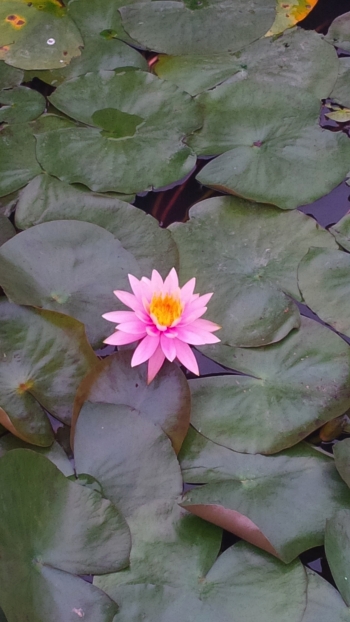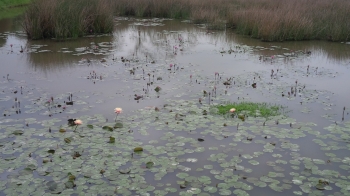Every year at Vesak, our community hosts a special Dharma Talk about Vesak, a ceremony with chanting and a chance for everyone to bathe a Baby Buddha statue with water and flower petals. Then we have a festive lunch and an afternoon of performances. My Vietnamese monastic sisters often express excitement over getting to, “Bathe the Baby Buddha” and speak of it as if it's natural for everyone to want to do this. We're told that it can represent honouring and nourishing the Buddha within, and this is beautiful. However, I usually find this ceremony a little strange. Especially because there are often plastic baby dolls like the ones my neighbour used to have from the 50's there, wrapped in ochre robes, alongside the black baby Buddha statue.
I love the practice of mindfulness and the teachings given by the Buddha have transformed my life. I want to touch something meaningful in this ceremony but in past years I hadn't been able to do this. So I usually use the ceremony as a time to practice walking and standing meditation, almost despite the fact that there is a ceremony going on. I don't think that I'm the only one in this situation.
We just passed another major holiday, being Easter, marked by a resurrection-themed Dharma talk and an Easter egg hunt for the monsatics and the retreat-goers with us. In the afternoon, one of my Vietnamese sisters said, “You eat a lot of chocolate today!”
I laughed and said, “Yes! It's an Easter Egg hunt. For Easter.”
She nodded, but it became clear that she had no idea what I was talking about. Her English is limited and my Vietnamese is not even that good. “Easter,” I said. “You know, Jesus? It's like Christmas, but when it's when Jesus died and then came back to life...” and I realized that trying to explain Easter, or Easter Egg hunting, would make very little sense to her, even if we could speak each other's languages fluently.
The death of Jesus and coming back to life is a normal story for those raised Christian like me, but it's not likely to make much sense outside of Christianity. And then, an Easter egg hunt? Well, eggs are symbols of fertility from pre-Christian times, taken over by the Christians to signify the resurrection. And somehow we tell children that an Easter Bunny brings the eggs that get hidden and they have to find them... it just makes less and less sense!
So I took out my dicitonary and we found “Easter” in Vietnamese and my sister said, “Yes! Easter! When is it?”
“Today,” I said.
“Oh!” she said. “And the chocolate?”
“Tradition,” I said. It's true. “It's usually for children, but we do it for the adults. That's why they were very happy to get the chocolate today.” And that was enough. The confusion over this sudden onslaught of chocolate eggs placed in flowerbeds was explained and we moved on.
I think of this now as we approach Vesak. Human cultures are filled with traditions, celebrations and religions that often make very little sense to the outside observer. We seem to think that we are rational creatures but really, we are social creatures. Celebration, ritual and religion have been the mainstays of cultures for as far back as history can tell. So what if it involved pouring water and petals over plastic dolls whose eyes bob open and close when you stand them up and lay them down? It's meaningful for some people and that's enough. So what if it involves hiding chocolate wrapped in gold foil in tulips and tree branch crooks? It's also enough. Coming together for joyful occasions is essential for our individual and collective happiness. I think it's vital for our sanity. A culture devoid of celebration is a dead culture, so we must celebrate.

















